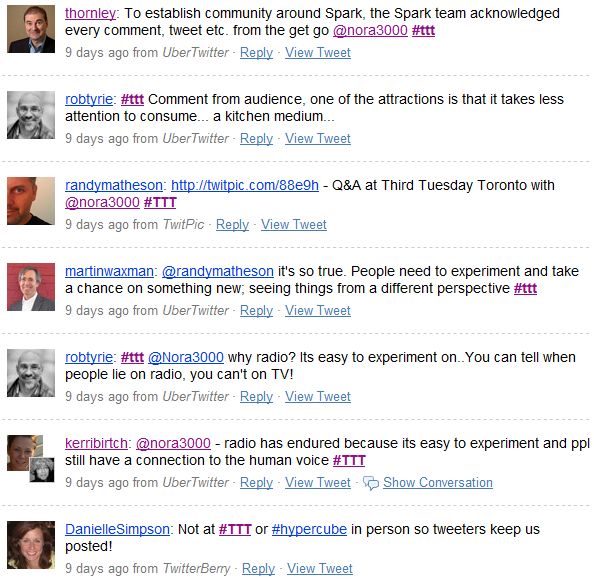Do you think that having the Twitter stream on a screen at conferences adds to the experience or participants and speakers or detracts from it?
The Advanced Learning Institute have asked my advice about whether they should have a second screen at all sessions of their upcoming Social Media for Government Conference to display the twitter stream throughout the conference. (Disclosure: I’ll be chairing the conference and presenting a workshop.)
I’ve seen this work well at tech conferences. At some conferences, a large number of participants are heavily engaged in twittering their conference experience – sharing points they think are important and then engaging in active discussion with other conference attendees as well as people joining in from outside the conference. For these people, the conference experience is greatly enriched. They can ask questions, consider alternatives and dig deeper through discussion with others. All in real time while the ideas are being discussed by the speaker.

How about the speaker, you ask? In my experience, a growing number of speakers embrace conference Twittering. Some follow the Twitter stream for questions. Others actually participate in it (This works especially well for panels.) After the conference, the speaker can gain valuable feedback on their presentation by reviewing the conference hashtag in the Twitter stream. And they don’t need to stop there. Savvy speakers can continue the conversation with conference tweeters after the conference.
However, I don’t think that Twitter is right for most conferences – yet. I think that may be overkill if your mix of attendees is not technically savvy. And that seems to be most attendees at standard business conferences. Just as important, some speakers are likely to object to it.
But that doesn’t mean that I’d leave Twitter out of a conference. In fact, having the Twitter stream on screen for select sessions demonstrates its potential to everyone. Having it up all the time may irritate those who are not on Twitter.
So, for the time being, I think that conference organizers should introduce Twitter at key points in the conference, but not have it present all the time.
What do you think?
Do you think that having the Twitter stream on a screen at conferences adds to the experience or participants and speakers or detracts from it? Am I underestimating the average conference attendee?
Other views on Conferences and Twitter
Ira Basen doesn’t like it
I do it
Dr. Shock suggests ways to use Twitter to get more out of lectures
David Berkowitz thinks conference blogging policies need updating



